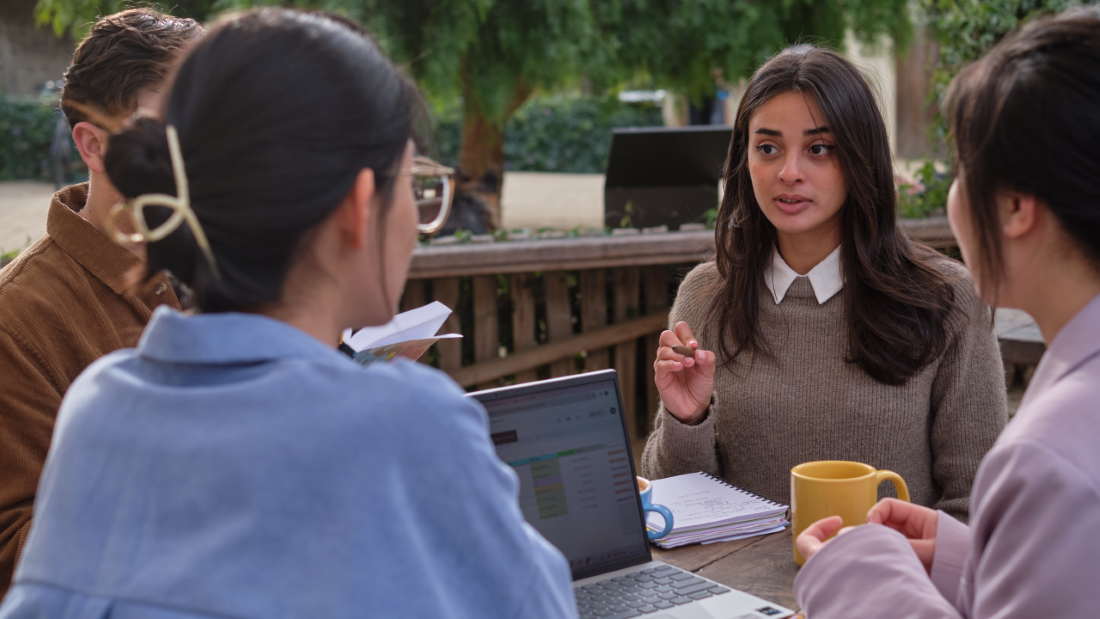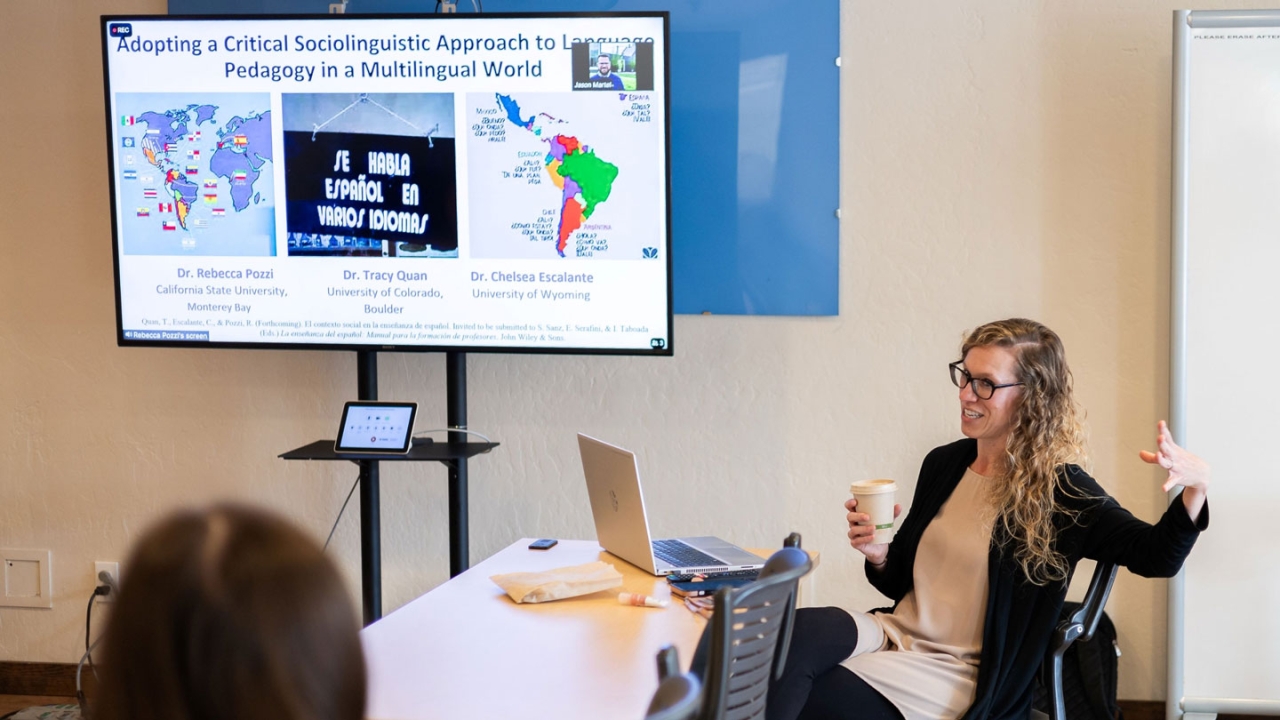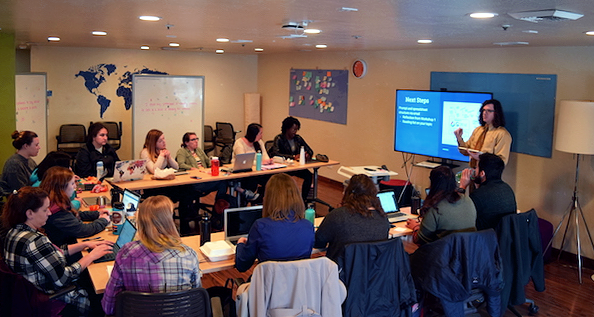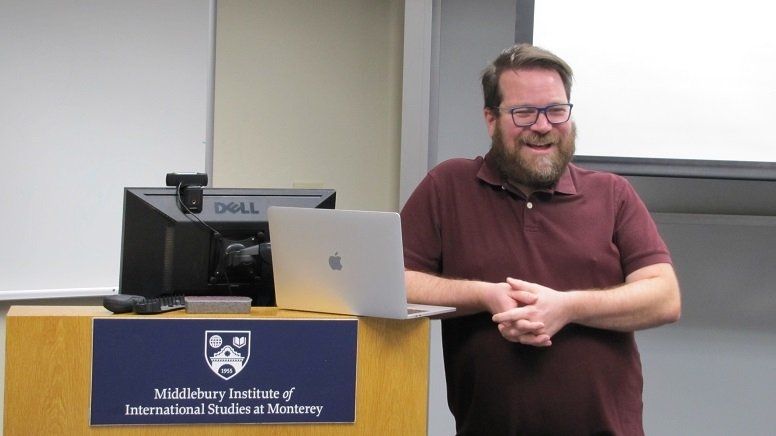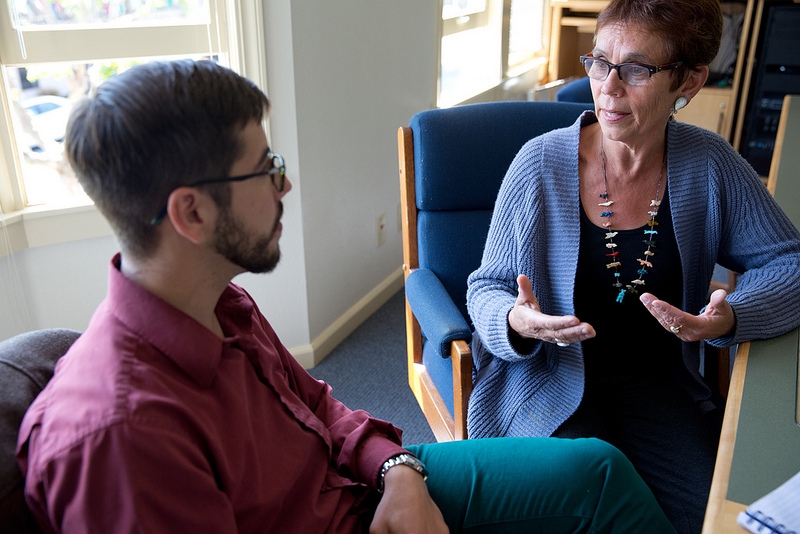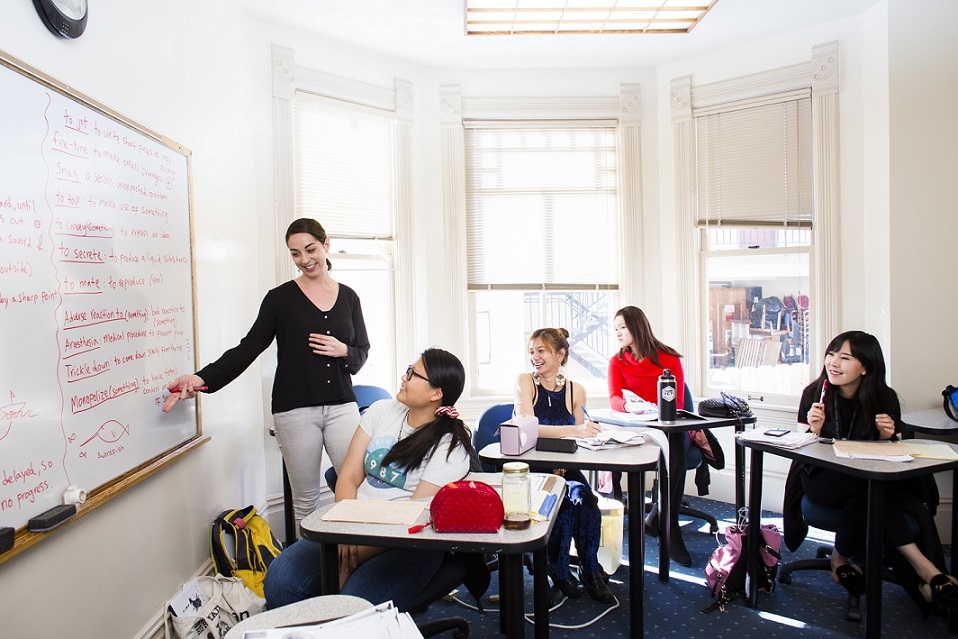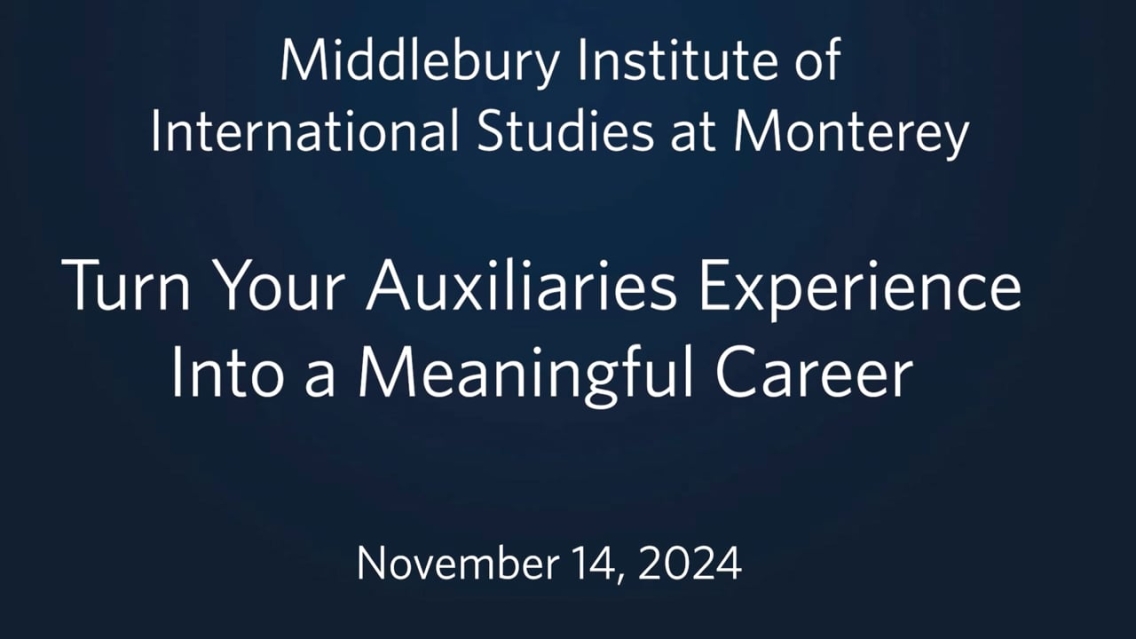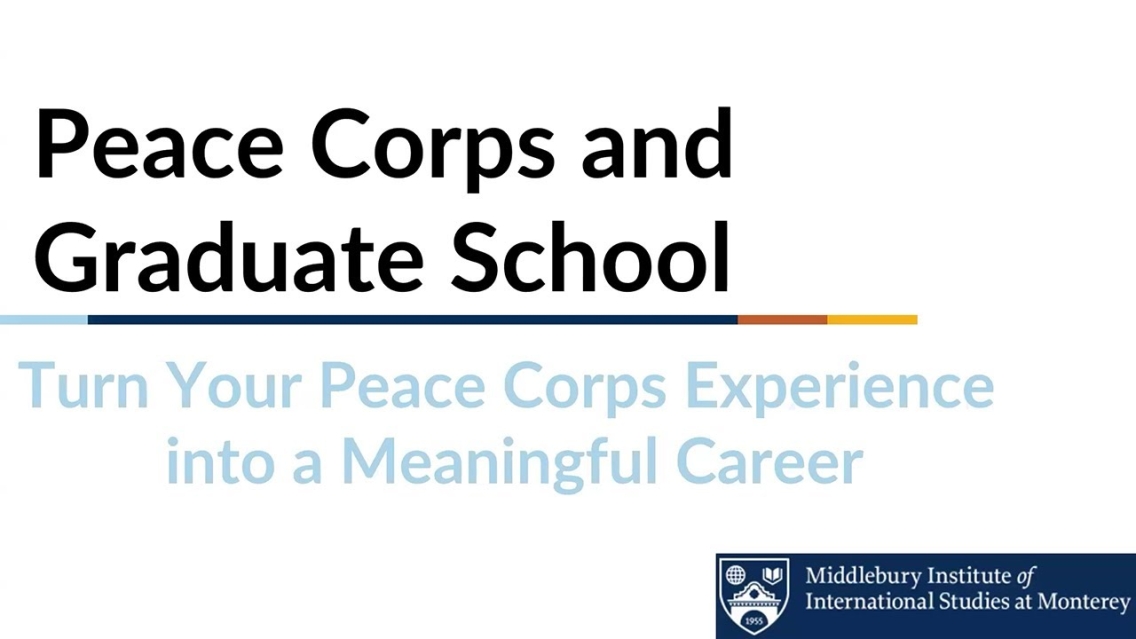Recordings
Watch recordings of online discussions with Middlebury Institute experts on a wide range of topics.
Development
The Leadership Challenge: Cultivating Everyday Leadership
Whether you’re a seasoned executive or emerging leader, this session with Dr. Cassandra D. Caldwell, Ph.D. will provide practical insights for becoming the kind of leader others want to follow.
Tariffs and Turmoil: The New Frontlines of Global Trade
President Trump has launched an economic war by applying tariffs on everyone, in different ways, and then spontaneously dropping, adjusting, threatening, and reapplying them again. Professor Robert Rogowsky will help you understand the situation and what might be lying ahead.
Empowering Change: Aligning International Policies with Sustainable Development Goals
Join professors Dr. William Arrocha and Dr. Scott Pulizzi, faculty from the International Policy and Development program, as they engage in a dialogue about the challenges faced by the Global South, as well as the dominant international policies originating from key Global North countries, new players like China and BRICS, and institutions such as the World Bank, the IMF, and the WTO.
US Presidential Election-Trade Policy Comparison
Professors from the International Trade master’s program will discuss the 2024 presidential candidate’s trade policy agenda and provide a comparative analysis of what voters can expect from each candidate.
Peacebuilding and Reconciliation in the Balkans
Dr. Thor Sawin leads a fieldwork program for Middlebury Institute students to the Balkans to explore the events after the breakup of Yugoslavia and analyze the roles identity, religion, language, and political ideology played in the conflict. Dr. Sawin will discuss what his students discovered in the most recent trip and share how some of the ideologies in the time period leading up to the breakup of Yugoslavia are still present today. He will compare and contrast what has been effective in transforming the postconflict societies that they visited.
Supporting Homeless Services with Data Science
The Middlebury Institute META Lab is evaluating the Coordinated Assessment and Referral System (CARS) on behalf of the Coalition of Homeless Services Providers (CHSP). The final report will help CHSP to measure how well the CARS system meets its compliance and effectiveness goals, as well as help explore the areas of greatest strengths and shortcomings, which will be utilized to suggest improvements to the program’s policies, procedures, and community investment.
Impactful Relationship Building with Central California Indigenous Community Partners
Hear from Professor Netta Avineri on how the Institute works with the Costanoan Rumsen Carmel Tribe on land use, recognition, and other social justice issues.
Women in International Trade
Join International Trade Alumnae as they share their experiences and impressive careers in the ever-expanding field.
International Trade, Inflation, and the Global Economy
Join Professor Robert Rogowsky of the International Trade program and Ed Brzytwa, vice president of trade for the Consumer Technology Association, who will discuss the connection between international trade, supply chains, inflation, and what economic impacts to expect in the next year.
International Policy on the West Coast
Join Dr. Beryl Levinger as she explains why the Middlebury Institute is an excellent place to launch your career, whether your path leads to D.C. or another center of international activity.
Education
Contemporary Careers in English Language Teaching
Join Middlebury Institute alumni and community members as they share their experiences and perspectives on teaching abroad, assessment development, teaching in K–12 schools in the United States, and more.
Enhancing Global Learning through Inclusion and Belonging
Join Dr. David Wick, our online International Education Management program chair, and faculty member Dr. Ximena Ospina to explore how inclusion and belonging shape learning experiences at home and abroad.
Creating Engaging Online Learning Spaces
Asynchronous doesn’t mean alone! TESOL professor and program chair Jason Martel demonstrates strategies for designing interactive online courses highlighting inclusivity and community-building in asynchronous spaces.
Exploring Social Justice in Language Education
Dr. Netta Avineri and Dr. Deniz Ortactepe from the TESOL and Teaching Foreign Language programs explore the diverse ways that social justice and language education are connected. They describe what social justice in language education is and show you how you can focus on this area. They also discuss their own research, projects, and initiatives that you can get involved with.
Careers and Trends in International Education
Post-pandemic, the international education field has seen exciting growth. Join renowned international education professionals Katherine Punteney, David Wick, and Daniel Chatham as they cover new opportunities and the skill sets you need to thrive in this dynamic field.
Beyond Study Abroad—International Education Careers
International education opportunities are not just in study abroad but also in technology, philanthropy, diplomacy, and more. Join Grace O’Dell for an exploration of the depth and breadth of international education careers.
International Student Mobility: Why Student Exchange is More Important than Ever
Dr. Anne Campbell has done extensive research on the intersection of international development and education. In this webinar she discusses the current political climate for exchange programs, and why she encourages the U.S. to increase funding for international student scholarships.
Interculturality: The Integral Link between Cultural Competence and Social Justice
Join renowned international education professional David Wick to explore incorporating interculturality into program design and how to work as part of a multicultural and multilingual team on projects with global reach.
Global Security
Quantum, AI, and the Cyber Frontier: Preparing Tomorrow’s Security Leaders
Cyber threats in the age of AI—and the looming impact of quantum computing—are fundamentally reshaping the cybersecurity landscape. Defenders are already tracking “harvest now, decrypt later” tactics, while AI-driven security operations accelerate across the defense landscape. Meeting these challenges demands fluency in core security principles, quantum-safe cryptography, and secure AI models. Join Cyber Program Director, Cagil Albayrak, to examine these critical questions—and explore how students at the Middlebury Institute are preparing to lead in this rapidly evolving field.
The Rise of the Violent Radical Right
The violent radical right is on the rise globally, from the activities of the January 6 and January 8 insurrections in the U.S. and Brazil, to Brexit and the war in Ukraine, the violent far right is building a digital community venerating mass shooters. A central question that begs an answer is whether we can meaningfully counter this rise or if legal systems’ limitations, such as the lack of an American domestic terrorism statute, can overcome decades of focus on the global war on terrorism to adapt to a new threat. Matthew Kriner, senior research scholar at the Center on Terrorism, Extremism, and Counterterrorism (CTEC) will share insights and the center’s work developing solutions.
Money Laundering, Fraud, and Financial Crime in a Pandemic Era
Expert Witness), and Professor Moyara Ruehsen explore seven typologies for COVID-related money laundering and fraud, conducting customer due diligence, and detecting red flags.
How AI and Deep Fakes will Amplify Terrorist Propaganda
Kris McGuffie, deputy director of Center on Terrorism, Extremism, and Counterterrorism (CTEC), and Alex Newhouse, digital research lead at CTEC, investigate how Artificial Intelligence (AI) and “deep fakes for text” are being weaponized in the hands of nonstate, nefarious actors.
Student On–Campus Jobs: Nonproliferation and Disarmament Training and Education
Join James Martin Center for Nonproliferation Studies (CNS) experts as they share their work supporting professional opportunities for our graduate students. CNS regularly collaborates with students on nonproliferation education and training initiatives, supports graduates with securing prestigious fellowships and internships at international organizations in the field of disarmament and nonproliferation, like the United Nations Office for Disarmament Affairs in New York and Vienna.
Careers Fighting Terrorism, WMD Proliferation, and Financial Crime
Join Professor Jeff Knopf, program chair of the Nonproliferation and Terrorism Studies (NPTS) program at the Middlebury Institute, and Elizabeth Bone, career and academic advisor for the NPTS program, for a discussion on careers in international security.
Is Domestic Terrorism a Greater Threat than Transnational Terrorism?
Professor Jason Blazakis, director of the Center for Terrorism, Extremism, Counterterrorism (CTEC), discusses the current threat landscape and the steps policymakers should take to counter the rise of the right-wing terrorists in the U.S.
Manafort’s Money: Investigating Financial Crimes
From nuclear proliferation to political upheaval to global terrorism; where threats exist, financial backing is making them possible. In this online discussion, Dr. Moyara Ruehsen discusses financial crimes through the lens of Paul Manafort’s money laundering case.
Russia on the Eve of 2018 Elections
Dr. Anna Vassilieva, director of the Monterey Initiative in Russian Studies, speaks about contemporary Russian politics and society through the lens of the presidential elections in spring 2018.
Snooping on North Korea from Monterey
The Center for Nonproliferation Studies (CNS) at the Middlebury Institute has been heavily featured in the news for their groundbreaking work analyzing North Korea’s nuclear program. Jeffrey Lewis, Director of the East Asia Nonproliferation Program at the CNS and MIIS faculty member, explains how we use language skills, satellite photographs, and 3D models to monitor North Korea’s nuclear and missile programs, all without ever leaving the splendor of the Monterey Peninsula.
U.S.-China Trade War or Tech War?
Professors Wei Liang and Robert Rogowsky, co-chairs of the MA in International Trade and Economic Diplomacy, discuss the ongoing US-China trade war. On the surface, this trade war has been driven by trade imbalance and job loss in the U.S. But it is a battle for tech dominance in disguise.
The World of Financial Crime
Professor Moyara Ruehsen explains the Financial Crime Management specialization (available in all degree programs) and the exciting careers it opens up—from investigative units at private banks to the FBI to compliance at tech companies like AirBnB.
Diverting Hate: A Means to Preventing Online Radicalization Pathways
Learn from a group of Middlebury Institute students that won a national competition with their “Diverting Hate” program aimed to combat hate, bias, and extremism. This team went on to win a grant from the Department of Homeland Security to continue working on their project.
The Future of Cyber Threats: Lessons Learned Leading New York City’s Cyber Command
Geoff Brown, who recently wound down his tenure as both New York City’s chief information security officer and the first-ever head of New York City Cyber Command, shares what he learned on the frontlines of cybersecurity.
Tracking the Far Right: Using Open Source Intelligence to Research and Disrupt Domestic Terrorism
Researchers from the Center for Terrorism, Extremism, and Counterterrorism (CTEC) Alex Newhouse, Erica Barbarossa, Meghan Rahill, and Enrique Nusi share their process for using open-source intelligence methods to map, analyze, and disrupt far-right extremism.
Language Services
Career-Boosting Tips for Language Students in the Age of AI
Join Translation and Localization Management professor and Localization Project Management program director, Adam Wooten, as he sheds light on the skills you should develop and career opportunities beyond teaching. Learn how to boost your language career with a Middlebury master’s degree, a relevant resume, a professional network, and the flexibility to adapt to a rapidly changing technical world.
Diplomatic Interpretation
Join our Spanish and French interpretation alumni working as diplomatic interpreters for an insightful conversation about their preparation methods, the highs and lows of their careers, and their invaluable advice for future professionals in this demanding industry.
Entertainment and Games Localization Career Panel
Alumni from our Translation and Localization Management (TLM) program share insights on how their Middlebury Institute experience has helped their careers in Gaming, Entertainment, and Technology.
Navigating the Growth of AI and Changes to the Language Services Industry
Join our translation, interpretation, and localization management professors and career advisor for a candid conversation about the evolving language services industry and how to navigate the growth of AI.
The Art and Science of Video Game Localization
Do you want to help launch video games that people around the world love? Join Professor Max Troyer and graduates of our MA in Translation and Localization Management (TLM) who are working in this vibrant industry. We will consider the different pathways to enter the field, including freelance linguist, quality assurance, project management, vendor management, and program management. Here’s your chance to hear from those who have successfully broken into the gaming world.
Japanese Translation & Interpretation Career Panel
Middlebury Institute alumni from the Japanese master’s programs in translation, translation and interpretation, and conference interpretation as they share insights on how their Middlebury Institute experience has helped them in their careers and the wide range of opportunities for our graduates in the language services industry.
You Love Languages. So, Now What? Turning Advanced Language Skills into a Fulfilling Career
Multilingual communication is more important than ever before, and speaking multiple languages can give you a leg up on the competition. But good information on how to turn your love of languages into a fulfilling career can be hard to come by. Join Professor Barry Slaughter Olsen for an insider’s view of the language professions and how to figure out if being a language pro is for you.
Japanese Translation and Interpretation Career Panel: Careers in Gaming, Entertainment, and Technology
Middlebury Institute alumni from our Japanese translation and interpretation master’s programs as they share insights on how their Middlebury Institute experience has helped their careers in Gaming, Entertainment, and Technology.
Localization—Your Global Career at the Intersection of Language, Culture, Business, and Technology
Companies like Netflix, Honda, and Facebook are eager to hire multilingual employees to enable global communication and growth in new markets. You have the language skills, now learn how you can develop your business, technical, and intercultural competence through our master’s degree in Translation and Localization Management (TLM) to quickly advance your career in the fast-growing language services industry.
Wanted: Japanese Language Professionals
The demand and earning potential for professionals with Japanese language skills are on the rise. Industry leaders such as Netflix, Honda, SalesForce, Nintendo, and AFLAC are desperately seeking professionals trained in Japanese translation, interpretation, and localization management. Winnie Heh, Career Advisor, and Professor Hideko Russell, Program Coordinator for the Japanese Translation and Interpretation programs, will discuss this growing career field.
The Robots Are Coming: How A.I. Will Change the Language Service Industry (and Why We’ll Still Need Humans)
Join faculty members Jane Nemcova and Adam Wooten to learn about how AI and Machine Translation has already changed the language service industry, what is coming next, and how important (human) language professionals will be in the future.
Interpreter’s Gold: Behind the Scenes at the Tokyo Olympics
Faculty members Laura Burian, Chiyo Mori, and Andrea Hofmann-Miller share their experiences interpreting at the 2020 (2021) Tokyo Olympic Games.
Finding a Career in the Language and Technology Industry (plus STEM information)
Localization is the process of adapting a product or content to a specific locale or market. The language services industry surpassed the $40 billion mark and is projected to continue its rapid growth. Middlebury Institute alumna and career advisor Winnie Heh shares information about how to prepare for these career opportunities and provides information on our MA in Translation and Localization Management being designated a STEM program.
Sustainability
Climate Finance: How to Pay for the Trillions Needed
Professor Lyuba Zarsky explores the promise and the pitfalls of public and private sources of global climate finance. Learn more about financing the global decarbonization transition, building resilience to climate change, public and private sources of global climate finance, and who will—and should—pay the trillions of dollars needed.
The Future of Food: Emerging Technologies in Cell- and Plant-Based Food Production
Next to decarbonization, ending the industrial animal agriculture system is essential for global sustainability. In this talk, Dr. Jason Scorse will provide an overview of how the current system is the worst of all worlds—environmentally unsustainable, unhealthy, and cruel—and he’ll discuss the new technologies (and policies) that can help pave the way to a more just and sustainable system.
Living with Climate Change
Recent extreme weather events—including Hurricane Irma—have starkly revealed human vulnerabilities to climate change, especially in large coastal cities. What can be done—and what is being done—to increase resilience? Professor Lyuba Zarsky is spearheading research on new approaches to climate resilient coastal infrastructure. In this online discussion, she outlines and assesses initiatives by city governments, community groups, and businesses to increase resilience through investment and governance strategies.
Are Surfers Raising Your Rent? How Environments Affect Our Economy
Dr. Scorse will use recent investigations into the impact popular surfing locations have on local economies as a window into the value of economizing our natural resources in service of their protection.
Careers in Environmental Policy
Two of our recent MA in International Environmental Policy (IEP) graduates: Kieran Ficken, Sustainability Program Manager at Measure to Improve, and Ella McDougall, Climate Ready Fellow at California State Coastal Conservancy, join Professor Jason Scorse, IEP program chair and Edy Rhodes, IEP career and academic advisor, for an online discussion on careers in environmental policy.
The Policy and Politics of the Green New Deal
With climate change accelerating and the Trump administration rolling back environmental protections, the Democrats have come out with an ambitious new plan to go big on climate policy, called the “Green New Deal.” Professor Jason Scorse, chair of our MA in International Environmental Policy, will discuss both the policy and politics of this new agenda.
How the Inflation Reduction Act Will Make the U.S. a Climate Leader
Dr. Jason Scorse, director of the Center for the Blue Economy and chair of the environmental policy program, discusses how the Inflation Reduction Act’s (IRA) meaningful investments in renewable energy will help the U.S. transition away from fossil fuels, and why this is the best environmental legislation he has ever seen.
Careers in Environmental and Social Justice
Gain insights from alumni who are using their careers to bring about the change they want to see in the world. After graduating from the Middlebury Institute, they launched careers in environmental and social justice.
Ocean Climate Action Plan: Influencing President Biden’s Build Back Better Campaign
Dr. Jason Scorse, director of the Center for the Blue Economy and chair of the environmental policy program, will discuss how the Ocean Climate Action Plan (OCAP)—developed by CBE and several partners—has influenced the U.S. president’s infrastructure bill.
The Institute
Conflict Transformation Info Session for Prospective Students
Dr. Netta Avineri and a panel of current fellows discuss the professional development, interdisciplinary engagement, research projects, and scholarship benefits of the Conflict Transformation Fellowship.
The Culture of Innovation
Join Dr. Jeffrey Langholz to learn about how one student and faculty collaboration resulted in a $50,000 prize and a highly successful innovative business, Water City.
Making the Most of Internships
Your internship can and should align with your personal and professional interests, leveraging many of the skills you have developed and will develop during your time at the Middlebury Institute—preparing you for future success. From working in refugee support to human rights and social change, current Middlebury Institute students and recent graduates discuss how they found their internships and incorporated them into their graduate school experience.
Program Info Sessions
Online MA in Localization Project Management Info Session
Join Professor Adam Wooten as he guides you through the curriculum, program structure, online learning environment, and career outcomes. Study at the intersection of business, language, culture and technology. Request info here.
Online MS in Cybersecurity Program
Program Director Cagil Albayrak discusses the MS in Cybersecurity, including the Cyber Defense and Intelligence track, hands-on learning experiences that prepare you for certifications such as CompTIA Security+ and CySA+, and in-demand career opportunities. Learn about our extensive faculty expertise and details on admissions and personalized support. Request info here.
Online MPA in Sustainability Info Session
Join Program Director Mahabat Baimyrzaeva, faculty member Chris Calwell, and career advisor Scott Webb as they guide you through the MPA in Sustainability curriculum, program structure, online learning environment, and career outcomes. You will deepen your real-world expertise and expand your professional networks as you learn from and work with experts in this growing field to make a positive impact on our society’s most critical issues. Request info here.
Online MA in Organizational Leadership Info Session
Join program director Cassandra Caldwell as she guides you through the curriculum, program structure, online learning environment, and career outcomes in our MA in Organizational Leadership. In addition to the leadership skills acquired, you’ll also develop the ethical and decision-making acumen needed to manage diverse organizations. Request info here.
Environmental Policy and Management
Join Environmental Policy and Management (EPM) program faculty and advisors as they guide you through the curriculum, experiential learning opportunities, and career outcomes of this STEM-designated degree.
Global Governance and Policy: Program Information Session
Our new MA in Global Governance and Policy will prepare you to address challenges like economic development, human rights, peace and security, sustainability, and international trade. Join program chair, Scott Pulizzi, and career advisor, Scott Webb, as they guide you through the curriculum, experiential learning opportunities, and transformative career outcomes for this new program
International Education Management Info Session
Join program chair David Wick as he guides you through the curriculum, program structure, online learning environment, and career outcomes. You will deepen your real-world expertise and expand your professional networks as you learn from and work with experts in international education, in this online program specifically designed for working professionals.
International Policy and Development (IPD) and International Trade Programs Info Session
Hear more about our International Policy and Development (IPD) and International Trade programs from faculty and advisors. They will guide you through the curriculum, experiential learning opportunities, and career outcomes of these in-person degree programs.
Nonproliferation and Terrorism Studies Info Session
Hear more about our Nonproliferation and Terrorism Studies (NPTS) program from faculty and advisors. They will guide you through the curriculum, experiential learning opportunities, and career outcomes of this STEM-designated, four-semester degree.
Threat Intelligence Information Session
Join program chair Katharine Petrich as she walks you through the curriculum, hands-on learning experiences, and career opportunities for our new MA in Threat Intelligence. This program will equip you with the knowledge and skills to detect, deter, and prevent cybercrime, espionage, financial crimes, and other security threats. You will learn to analyze geopolitical, economic, and social risks using qualitative and quantitative methods.
TESOL
Join program chair Jason Martel as he guides you through the curriculum, program structure, online learning environment, and career outcomes. In addition to preparing you to teach in various settings, in the U.S. and abroad, our program also develops you professionally to influence education inside and outside your classroom, including equitable hiring practices and inclusive teaching.
Translation and Localization Management Info Session
Join program faculty and advisors as they guide you through the curriculum, experiential learning opportunities, and career outcomes of our MA in Translation and Localization Management (TLM).
Translation, Translation and Interpretation, and Conference Interpretation Info Session
Join program faculty and advisors as they guide you through the curriculum, experiential learning opportunities, and career outcomes of our MAs in Translation (T), Translation and Interpretation (TI), and Conference Interpretation (CI).

